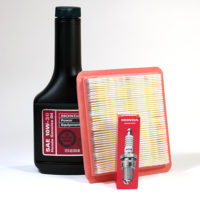Mowing in Summer Heat
Summer has arrived. The sun is shining. Temperatures are soaring. While we cool off around the pool, on the lake or with an icy beverage, our lawns are stressed. Protect your grass, plants and lawn care equipment with safe and smart operating practices.
Make sure your mower is safe to operate
- Sharpen or replace dull blades. A clean cut reduces water loss on already thirsty plants.
- Clean your mower of dried grass and debris. Grass packed around the engine, pulleys or even under the deck poses serious fire hazards. Clean equipment using a gas blower, compressed air, pressure washer or just a rag and bucket of soapy water.
- Another fire prevention technique is to fill your fuel tank when the engine is cool.
- Filling your fuel tank before cutting, prevents airborne debris (like freshly cut dry grass) from contaminating your fuel supply.
- Check your oil level. Small engines burn oil during extreme temperatures.
- Set your mower at an appropriate level. Never remove more than one-third of the height of grass. Taller plants recover quicker and provide shade at the soil surface.
Design a plan to reduce lawn stress
- Mow early in the morning when grass is damp or on days when rain is in the forecast.
- Avoid trampling highly stressed grass. Grass is most stressed next to streets, driveways and sidewalks. The heat from these surfaces damages the root system of your lawn. Often, we turn our mowers around on these areas. When possible, turn on the street, driveway or sidewalk. Always avoid making multiple passes over the same areas.
- If you choose to water your lawn, optimize the effectiveness of irrigation systems. Irrigating before sunrise allows water to soak the soil surface. Water is not lost to evaporation and runoff.
- If there are areas that are annually plagued by high sun and poor growth, consider planting trees, shrubs or even hardscape features. Removing highly stressed areas will promote a stronger root system throughout your entire lawn.
- Loosen mulch around trees and shrubs. After a spring and early summer of heavy rainfall, mulch beds are compacted. Loosening the mulch in these beds cools the roots of trees and shrubbery.


Recent Comments